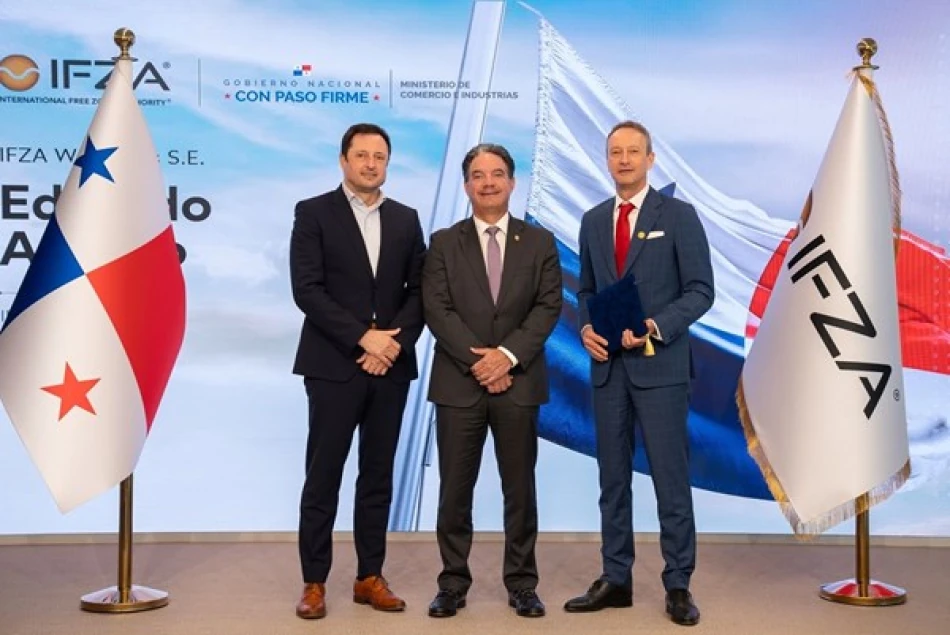
EVFZA Launches New Free Trade Zone in Panama, Enhancing Regional Commerce
IFZA Expands to Panama, Creating Strategic Bridge Between Latin America and UAE Markets
The International Free Zone Authority (IFZA) has officially launched operations in Panama City, marking its first physical presence in Latin America and establishing a crucial business corridor between the Americas and the UAE. This strategic expansion leverages Panama's position as the "Center of the Americas" to offer companies enhanced access to both regional markets through a comprehensive free zone model that has already supported over 60,000 businesses globally.
Panama Emerges as Gateway for Cross-Continental Trade
The Panamanian government has granted IFZA an official license to establish and operate a free zone in the country, recognizing the emirate-based authority's proven track record in creating investor-friendly infrastructure. This move positions Panama alongside other major free zone hubs like Dubai, Singapore, and Hong Kong in the global trade ecosystem.
Panama's appeal mirrors many characteristics that made Dubai a commercial powerhouse. The country hosts more than 60 local, regional, and international banks, operates a dollar-based economy, and sits at the strategic crossroads between North and South America. The Panama Canal and globally connected air transport network further enhance its logistics advantages for nearshoring strategies and international expansion.
Regulatory Environment Signals Investment Confidence
The timing of IFZA's expansion reflects Panama's improved regulatory standing in international markets. The country was removed from the Financial Action Task Force's grey list in 2023 and from the European Union's high-risk countries list in 2024, significantly boosting its attractiveness to international investors seeking compliant jurisdictions.
This regulatory rehabilitation puts Panama in a similar category to other reformed financial centers that have successfully attracted foreign direct investment by demonstrating commitment to international compliance standards.
Multi-Sector Hub Targets Diverse Industries
The new free zone will operate as a multi-purpose hub supporting professional services, technology, logistics, trade, software development, and various manufacturing industries. Companies operating within IFZA Panama will benefit from substantial tax advantages, including exemptions from corporate income tax, customs duties, and value-added tax.
Martin G. Pedersen, IFZA's Chairman, emphasized that Panama's strategic geographic location, robust banking system, modern infrastructure, dollar-based economy, and business-supportive regulatory framework make it an ideal partner for the authority's next growth phase.
Market Implications for Regional Trade Flows
This expansion creates significant implications for trade patterns between the Middle East and Latin America. Companies can now establish operations in Panama to access both the large Latin American consumer market and leverage existing UAE trade relationships extending to Africa, India, and Pakistan.
The move also positions IFZA to compete with established regional free zones in Colombia, Costa Rica, and other Central American countries, potentially reshaping how international companies approach market entry strategies in the region.
Comprehensive Business Ecosystem Beyond Tax Benefits
Beyond tax incentives, IFZA Panama will offer an integrated service package including company formation and registration, visa services with family sponsorship options, office solutions and workspaces, corporate banking support, accounting and tax registration services, and relocation guidance covering real estate, schools, and lifestyle needs.
Jochen Knecht, CEO of IFZA Dubai, stated that the initiative aims to build more than just a free zone, creating a bridge that enables companies to expand confidently between Latin America and the UAE with shared business principles.
Strategic Expansion Plans Across Latin America
IFZA's Panama launch represents the first step in a broader Latin American expansion strategy. The authority plans to explore opportunities throughout the region while adapting its free zone model to reduce market entry barriers, ensure compliance, and accelerate business growth.
This regional approach suggests IFZA recognizes Latin America's growing importance in global supply chains, particularly as companies seek alternatives to traditional manufacturing and service hubs. The expansion also reflects the UAE's broader diplomatic and economic engagement with Latin American countries, following similar patterns of Gulf state investment in the region.
Most Viewed News

 Layla Al Mansoori
Layla Al Mansoori






